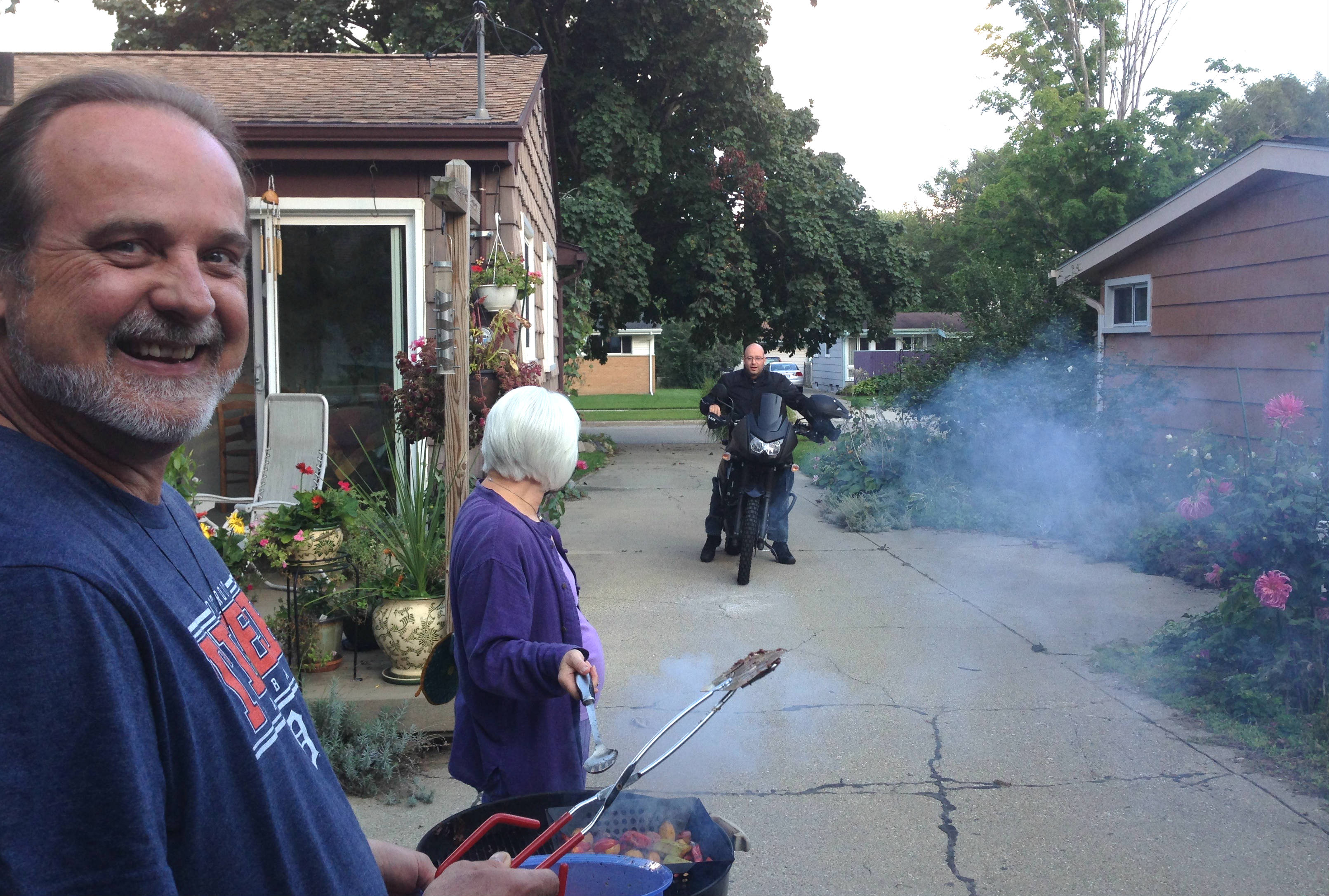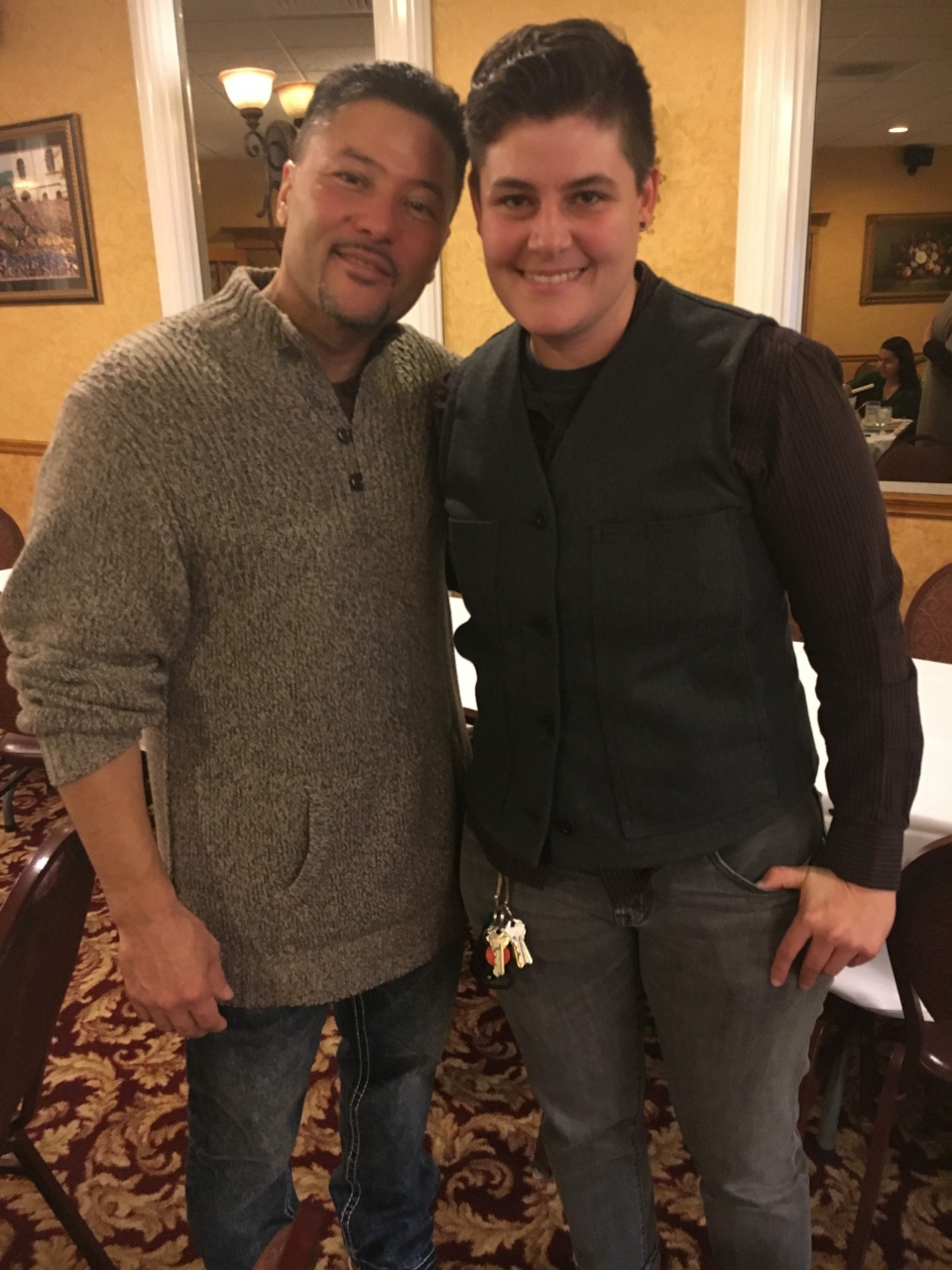
TJ (left), who spent 40 years in prison, was a longtime advocate in navigating and confronting prisons. Courtesy Natalie Holbrook
For over a decade, Natalie Holbrook has worked for AFSC's Michigan Criminal Justice Program, advocating for people in prisons around the state. She reflects on the highs and lows that came with one recent week in her advocacy work.
On Nov. 15, I picked my daughter up early from school and drove with her to Roman Village in Detroit for my friend Junito's coming home party. What a joyous day. His huge family filled a social hall at the restaurant. My daughter played balloon toss and hid under tables with Junito's nieces and nephews' small kids.
His children—his youngest was 4 when he went to prison—surrounded him with their glowing faces tempered with a kind of awe and disbelief knowing that their dad was finally among them.
Out of his blues. In a sweater and jeans. Smiling, laughing, sobbing.
In a deep hug, we cried. This former, hardened drug dealer and rabble rouser looked at me with tears streaming down his face and thanked me for standing by his side and for accompanying him and his family on his path toward freedom.
 I first came to know Junito's case five years ago, when his youngest daughter called me on the phone asking why the parole board "flopped" her dad, deciding to keep him in prison for five more years. And then our journey began. Our office used the Freedom of Information Act to get his public hearing transcript. We read through it to see where he floundered during the hearing. We read through his pre-sentence investigation and got an in-depth understanding of his case, his life before his case, and his life after his case.
I first came to know Junito's case five years ago, when his youngest daughter called me on the phone asking why the parole board "flopped" her dad, deciding to keep him in prison for five more years. And then our journey began. Our office used the Freedom of Information Act to get his public hearing transcript. We read through it to see where he floundered during the hearing. We read through his pre-sentence investigation and got an in-depth understanding of his case, his life before his case, and his life after his case.
He was serving on a life sentence for distributing 650 grams or more of cocaine. It became clear that the parole board thought he was not prepared for release because he did not know the definition of a "relapse prevention plan." We worked with Junito on his case. We also used his hearing as an example to help other people in prison and others in the community understand the public hearing process.
When I started working with a small group of men at Kinross prison, where Junito was, to develop a peer-to-peer program, he was there—a founding member of the course, which dealt with accountability, responsibility, working through trauma and shame, and other things needed to get ready for parole or commutation.
Junito worked hard with us, with his peers, and for others to harness the skills to demonstrate to those with the power to release him that he would not turn to methods of survival that bump up against law and order.
Junito was ready to go home five years ago, but he needed to prove to authorities and bureaucracies that he was really ready. He went above and beyond demonstrating his personal transformation by reaching out to other men inside and helping them understand the parole process and giving them guidance and compassion through their difficult histories of violence and trauma.
This slow process of getting one person free at a time takes a toll on the person in prison, loved ones, families, friends, and advocates. We wade through the deepness of draconian state systems that are rooted in enduring punitive responses to the harms that are perpetrated in our communities.
As advocates, we work to help people navigate these huge systems of control, confinement, and security to help them reach the end of the maze. We act as streetlights on the dark path home. We build desired systems change strategies around policies, laws, and litigation based on these individual cases, but these changes are hard to make, and the road to comprehensive, much-needed change is the road of the tortoise.
I first started working with AFSC’s Michigan Criminal Justice Program back in 2003. My first day on the job, we got a call on our phone line dedicated to people making calls from prison. My supervisor, Penny, answered and then called me into her office, saying she wanted me to meet someone. Even on the phone, TJ’s gentle, husky voice seemed to fill up our tiny, garage office, which was piled with prisoners' letters, reports, letters to prison officials, phone call notes, email messages, and prison policy directives.

From that day forward, TJ became my friend, a mentor, a leader in the work, an expert in the field of navigating and confronting prisons, one of the inside prison leaders—a compass.
He helped to teach me the importance of listening, practicing patience, distilling, collecting, paying attention to details, stopping ourselves from otherizing, documenting, hearing from many voices to make sure a problem is actually a problem, and rolling up our sleeves to get what work we can get done done.
TJ went to prison for murdering his next-door neighbor when he was 15 years old. His actions were violent, thoughtless, heinous and, to some, unforgiveable.
He was sentenced to prison for a parolable life sentence in 1974. He ended up serving nearly 40 years. AFSC stood by his side throughout his incarceration. He helped us in our work, and we worked to support him in all things pointing to his release.
When a lawsuit finally forced the parole board to provide meaningful review to people serving parolable life sentences, board members wanted to let him out, but a judge continually blocked his release. Finally, after advocacy, a different judge agreed to let the board's movement toward release go forward.
With his support team by his side, TJ went through the public hearing process and was released from prison in July of 2014.
The husky voice I had learned so much from for 12 years on the phone, was now a live person walking among us. My daughter, the small child he always asked about on the phone line from prison, finally met him face to face. The day of his release was joyous and a reminder that this work is not in vain.
On Nov. 17, 2016—two days after I held Junito in a strong hug at that family restaurant in Detroit—TJ died in a free-world hospital, following a short and surprising illness. He was surrounded by loved ones singing to him, holding him, and caring for him. If he had been in a prison hospital, he would have died alone.
TJ's and Junito's stories—those of redemption, transformation, freedom, hardship, sadness, glimpses into goodness—are not anomalies. They are the work of supporting those doing the longest of long time in our prisons. People who care about prison abolition or reform or just basic human suffering must consider when death inside a prison is the only out to freedom. It is hard to carry it alone. We need the many to help us build a fierce network of support for every person in this country serving long, long time. It will not be easy.
In this work, people ask me all the time how to get involved. When I suggest writing—with technical, educational, and resource support from our organization—to a person serving a life sentence, the people often shy away.
I am not quite sure if they think that working for legislative change is more appealing, if they are scared of someone who is serving a prison term for rape or murder or drug trafficking, or if they simply don't really want to do the hard work of being connected to the people who are the casualties within the system we are seeking to change.
If you care about racial justice, intersectional justice, freedom, and creating possibility that is not reliant only on policy makers and the system, then get up and join in the support of people serving the other death penalty—life and long indeterminate sentences. The long-term changes we need to open the gates wider cannot happen until we change the hearts and minds of the public and move all of us on a path toward redemption, inclusion, and healing.